Have you ever wondered why green tea is so good for you? It comes from the Camellia sinensis plant. People love it for its taste and its high antioxidant levels.
Green tea has more antioxidants than any other tea. These antioxidants are called polyphenols. They are very good for your health. Drinking green tea can help prevent cancer and keep your heart healthy.
It’s amazing how green tea can make you feel better. Let’s look at how it works and why it’s so good for you.
Key Takeaways
- Green tea boasts the highest concentration of polyphenols among all tea varieties.
- Regular consumption is linked to significant health benefits, including reduced cancer risks.
- Drinking three cups of green tea daily may aid heart health and cholesterol management.
- It offers a source of antioxidants that can help prevent various diseases.
- The unique processing of green tea preserves its potent antioxidant properties.
Introduction to Green Tea
Green tea has become popular worldwide for its unique taste and health benefits. It comes from the leaves of Camellia sinensis. This drink has a long history, starting over 4,000 years ago in China.
Today, green tea is a big part of cultures in Japan and Taiwan. It’s loved for its special qualities and is a big part of daily life.
In Western countries, green tea is gaining fans fast. People are learning about its health perks. It’s packed with antioxidants that help with heart health, weight, and even fighting cancer.
There are many types of green tea, like Sencha, Bancha, and Matcha. Sencha is Japan’s favorite. Each type has its own taste and use.
Green tea is special because it has lots of catechins. These are powerful antioxidants. The amount of catechins can change based on where the tea is grown.
Green tea is more than just a drink. It’s full of vitamins and minerals that make you feel good. It’s a great way to boost your health.
What Are Antioxidants and Why Are They Important?

Antioxidants are natural compounds that help keep your body healthy. They fight off free radicals, which are harmful molecules. Knowing about antioxidants helps us see their role in keeping us well.
Free radicals are made in our bodies from metabolism, exercise, and pollution. They can damage cells. Antioxidants stop this damage by balancing out free radicals.
Antioxidants are key in fighting oxidative stress. This is when free radicals outnumber them. Too many free radicals can lead to serious diseases like cancer and heart disease. Studies show that antioxidants can help lower the risk of these diseases.
Green tea is a top source of antioxidants. It has a lot of polyphenols, like EGCG. Drinking green tea can add to your antioxidant intake.
Adding antioxidants to your daily routine can help fight diseases. Drinking green tea regularly may cut the risk of esophageal cancer by nearly 60%. It also helps with weight loss by burning fat.
Green Tea: A Potent Source of Antioxidants

Green tea is known for its high levels of antioxidants, mainly polyphenols like catechins. These compounds fight oxidative stress and offer health benefits. Knowing about the antioxidants in green tea helps us see its unique health effects.
Key Polyphenols in Green Tea
Epigallocatechin gallate (EGCG) is a key green tea polyphenol. Studies show it’s a strong antioxidant that fights free radicals and protects cells. Drinking green tea regularly may help reduce inflammation and lower disease risk.
How Antioxidants Work in the Body
Antioxidants in green tea, like catechins, neutralize harmful ROS. They also boost the body’s natural defenses by making more enzymes. This shows how antioxidants protect us in two ways.
| Type of Antioxidants | Sources | Potential Benefits |
|---|---|---|
| Catechins | Green tea | Reduces oxidative stress, lowers blood pressure |
| Flavonoids | Fruits, vegetables | Improves heart health, supports weight management |
| Vitamin C | Citrus fruits, berries | Boosts immune function, improves skin health |
| Vitamin E | Nuts, seeds, green leafy vegetables | Protects against oxidative damage, supports eye health |
Adding green tea to your diet can bring many health benefits, thanks to its antioxidants. Learning about these antioxidants helps you make better choices for your health.
The Health Benefits of Green Tea

Green tea is packed with health benefits that have caught the eye of many. It’s rich in polyphenols and antioxidants. These compounds help in preventing cancer, improving heart health, and aiding in weight loss.
Potential Cancer Prevention
Studies show green tea may help lower cancer risk. It contains catechins, like EGCG, which fight inflammation and cancer cells. This makes green tea a strong ally in cancer prevention.
Heart Health and Cholesterol Management
Green tea is good for your heart. Drinking five cups a day can cut down heart disease deaths. It also lowers stroke risk, as found in a study with over 82,000 participants. Green tea’s antioxidants and polyphenols help manage cholesterol, boosting heart health.
Weight Management and Metabolism
Green tea can boost your metabolism, helping with weight loss. Mixing it with ginger makes it even more effective. With just a few calories, green tea is a great choice for those watching their weight.
| Study | Participants | Finding |
|---|---|---|
| Cardiovascular health study | 40,000 | 5+ cups linked to low risk of death from cardiovascular diseases |
| Stroke risk study | 82,000 | 4+ cups linked to reduced stroke risk |
| Weight loss study (green tea + ginger) | N/A | Enhanced effects on weight loss |
Is Tea a Good Source of Antioxidants?
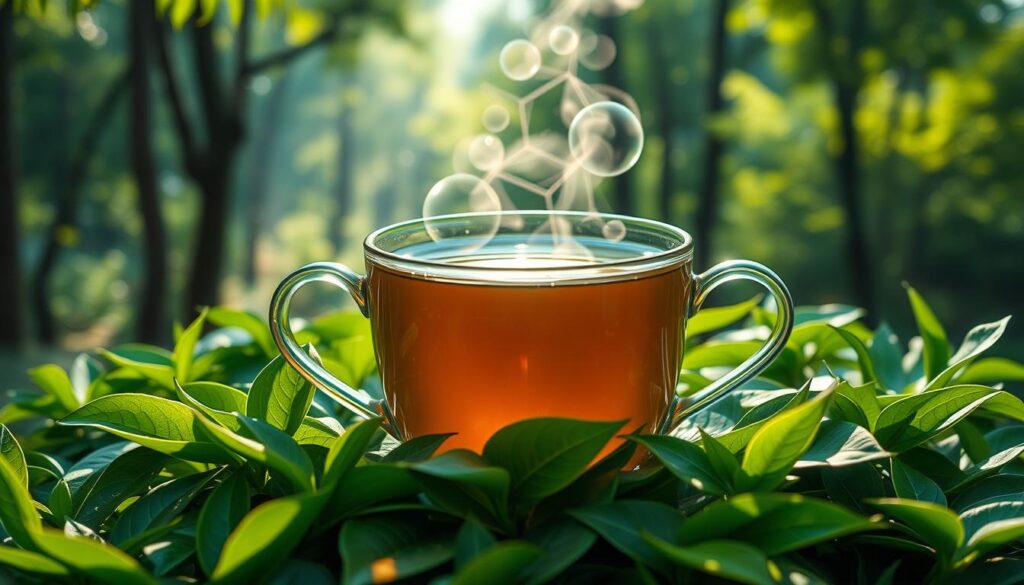
Many people wonder if tea is a key source of antioxidants in today’s health-focused world. Green tea is known for its high antioxidant content in tea. It has more antioxidants than black and oolong teas.
Green tea is full of polyphenols like catechins. These offer big benefits of tea antioxidants. They fight oxidative stress by stopping free radicals. Free radicals can cause serious health problems and speed up aging.
Studies show drinking 2-3 cups of tea a day can lower the risk of heart disease and type 2 diabetes. This makes tea, and green tea in particular, a tasty way to boost your health.
Even though black tea is more popular, green tea’s antioxidants are unmatched. Adding tea, and green tea in particular, to your daily routine can help your body fight off diseases and improve your health.
Which Green Tea Has the Highest Antioxidants?
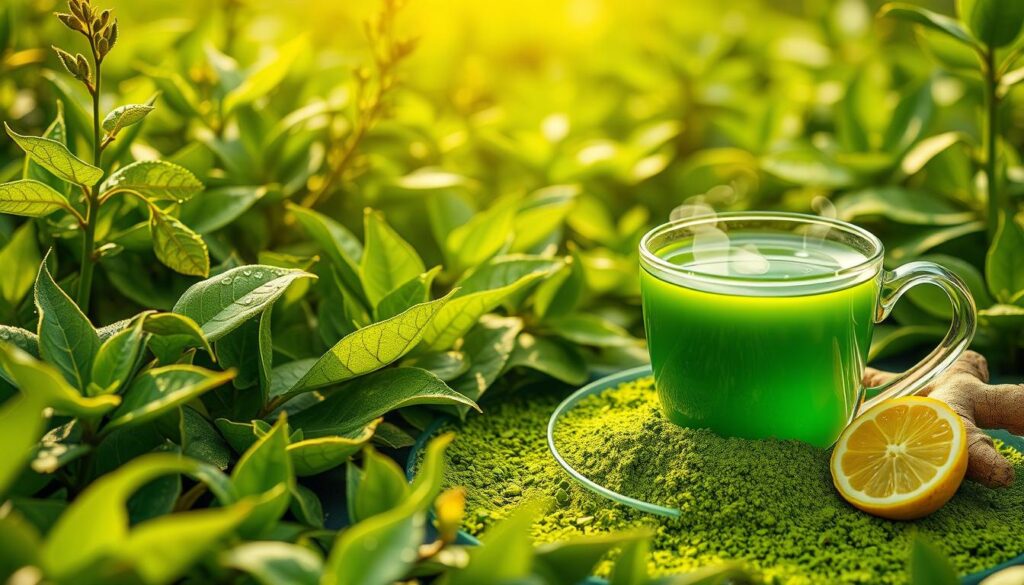
Matcha is the green tea with the most antioxidants. It’s made from whole leaves ground into a fine powder. This way, you get all the leaf’s benefits, making matcha very rich in antioxidants.
Matcha has up to ten times more antioxidants than regular green tea. Drinking one cup of matcha is like drinking three cups of regular green tea in terms of antioxidants. Sencha and gyokuro are also good, but matcha has more antioxidants.
Antioxidant levels in green tea can change due to growing conditions, processing, and brewing. These factors affect the health benefits you get. For example, green tea’s antioxidants help with heart health, weight, and cancer prevention.
In short, while many green teas are healthy, matcha is the best for antioxidants. Drinking it regularly boosts your health and wellness.
How to Enjoy Green Tea: Preparation Methods
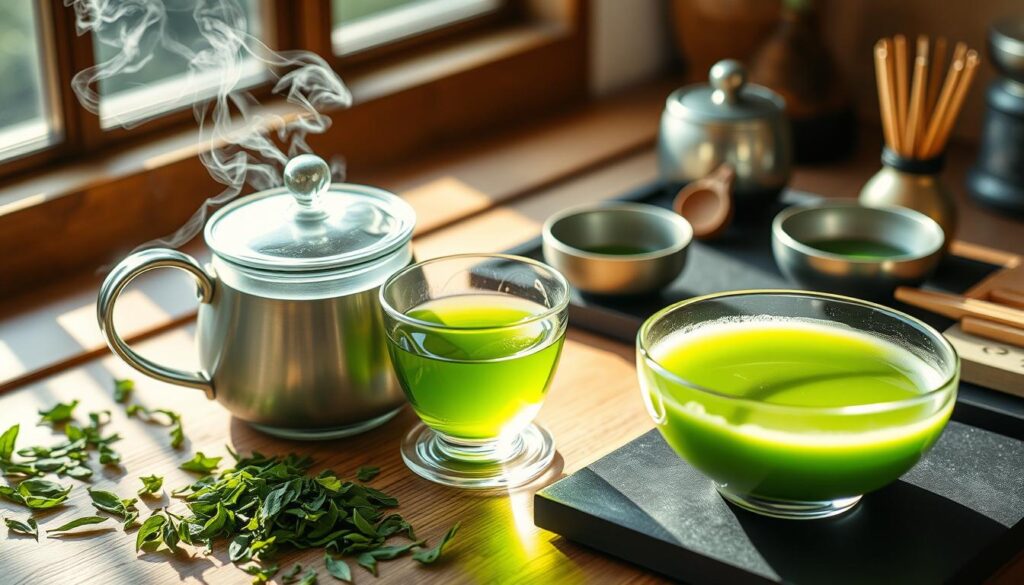
Getting green tea right is key to its health benefits. Knowing the best ways to prepare it lets you enjoy it more. It also helps get the most antioxidants out of it.
Steeping Techniques
Steeping green tea means using hot water to get its good stuff. The right temperature and time are important. For example, steeping at 100 degrees C for five minutes boosts antioxidants a lot.
Experts say the best temperature is between 195°F and boiling. Steeping for up to 4 minutes is ideal.
- Steep at higher temperatures (up to 100°C or 212°F).
- For optimal flavor, consider avoiding dairy products which can affect antioxidant levels.
- Consume alongside vitamin C-rich foods, like strawberries or lemons, to enhance antioxidant absorption.
- Wait two hours after meals to maximize iron absorption and avoid interference with nutrient uptake.
Cold Brew and Matcha Options
Cold brew green tea is a cool choice. It slowly extracts flavors, making a smooth drink without bitterness. Just steep tea leaves in cold water for hours, like overnight.
Matcha is another great option. It’s made by whisking green tea powder with hot water. This way, you get more of a key antioxidant called EGCG. Matcha has three times as much EGCG as regular green tea.
| Preparation Method | Benefits | Caffeine Content (per 8 oz) |
|---|---|---|
| Steeping Green Tea | High antioxidant extraction, possible health benefits | 35 mg |
| Cold Brew Green Tea | Smooth flavor, less bitterness | Lower than hot brewed green tea |
| Matcha Preparation | Higher EGCG levels, unique flavor experience | 64 mg |
Caffeine Content: What You Need to Know
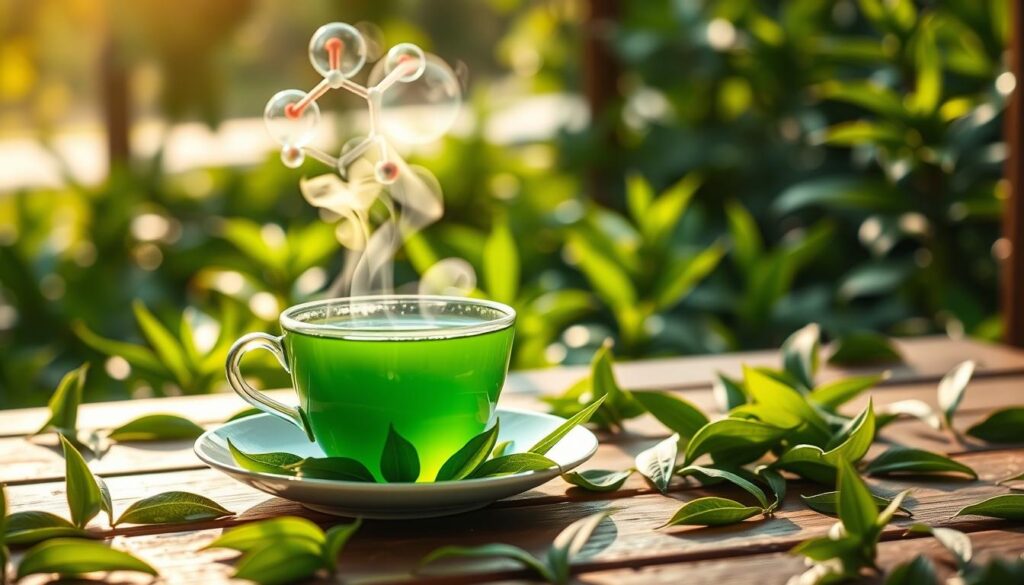
Exploring caffeine in green tea raises questions about its effects and how it stacks up against other drinks. An 8-ounce cup of green tea usually has 30 to 50 mg of caffeine, as the U.S. FDA estimates. This is much less than coffee, which can have 80 to 100 mg in the same size.
Knowing how much caffeine is in green tea is key for those who are caffeine-sensitive. While a bit of caffeine can boost alertness and brain function, too much can cause problems like insomnia and anxiety. Drinking green tea daily can add up to 8 to 10 percent of the FDA’s daily caffeine limit, which is 400 mg for adults.
Green tea types vary in caffeine levels. Matcha green tea, for example, can have 18.9 to 44.4 mg of caffeine per gram. This means a typical 2-gram serving could have up to 88.8 mg of caffeine. Sencha green tea, on the other hand, might have up to 75 mg per cup. This shows why knowing your green tea type is important.
| Beverage | Caffeine Content (per 8 oz) |
|---|---|
| Green Tea | 30 to 50 mg |
| Black Tea | 30 to 50 mg |
| Coffee | 80 to 100 mg |
| Soda | 30 to 40 mg |
| Energy Drinks | 40 to 250 mg |
When thinking about caffeine, remember the differences. The effects of caffeine in green tea can be good when part of a healthy diet. It lets you enjoy the benefits of caffeine without overdoing it. Choosing loose-leaf green tea might give you more caffeine than tea bags, which use smaller leaves.
Potential Interactions and Considerations
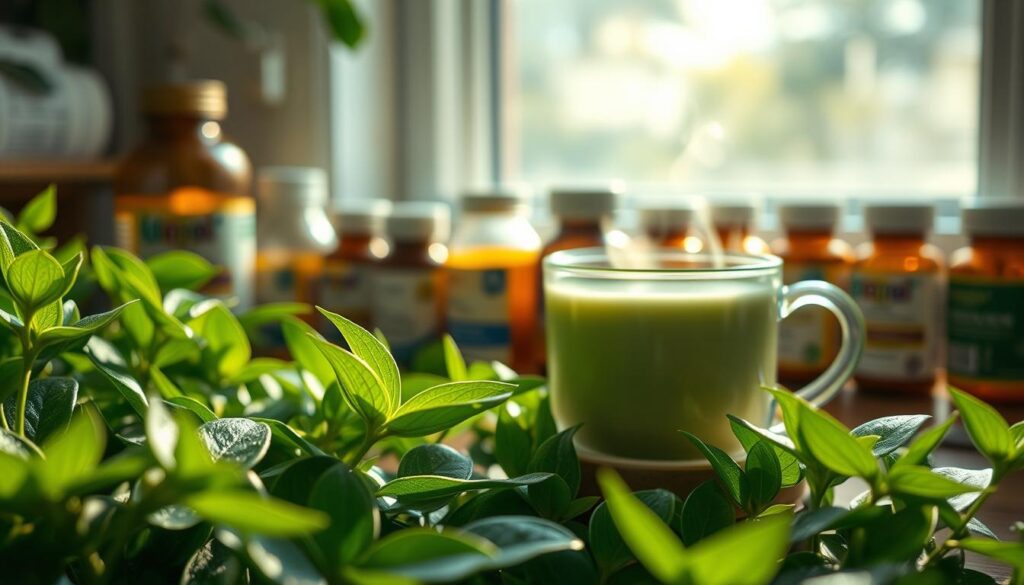
It’s important to know how green tea might affect your medications. Also, picking high-quality tea is key. Green tea can interact with some medicines, like blood thinners. Always talk to your doctor before drinking more green tea if you’re on these medicines.
Medication Interactions
Green tea can affect certain medicines, like warfarin. The vitamin K in green tea might change how blood clots. If you’re taking these medicines, watch how much green tea you drink. Always check with your doctor before drinking more green tea.
Quality Matters in Green Tea Selection
The quality of green tea is very important for its health benefits. Choose organic and well-known brands. High-quality green tea has more good stuff like EGCG. This choice improves taste and health benefits, making quality a big deal.
How Green Tea Supports Oral Health
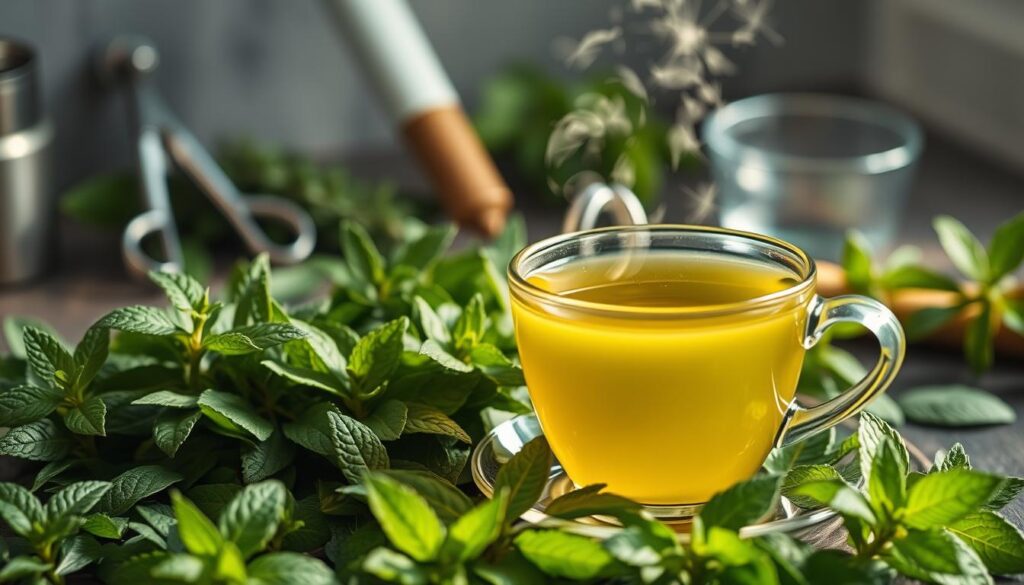
Research shows that green tea oral health benefits are real. It can help keep your teeth and gums healthy. Green tea fights off bad bacteria like Porphyromonas gingivalis and Prevotella intermedia, which cause gum disease and cavities. This is thanks to a powerful compound called epigallocatechin gallate (EGCG).
Green tea also helps with periodontal health. People who drink it every day have less gum bleeding and deeper pockets around their teeth. Plus, using green tea as a mouthwash is safe and doesn’t irritate your mouth.
Green tea is full of fluoride, which helps prevent tooth decay. It also has hydroxyapatite, which helps strengthen tooth enamel. Drinking green tea can make your mouth’s pH level higher, which helps prevent cavities.
Adding green tea to your daily routine can greatly improve your oral health. Try drinking green tea regularly for a healthier mouth and better overall health.
| Green Tea Oral Health Benefits | Details |
|---|---|
| Reduces Bacteria | Inhibits harmful bacteria linked to gum diseases |
| Supports Periodontal Health | Decreases gingival bleeding and pocket depth |
| Fluoride Content | Enhances anti-cavity effects |
| Panting for Dental Health | Improves salivary pH; reduces dental caries |
| Non-toxic Mouthwash | Safely replaces traditional antiseptics |
Conclusion
Green tea is a standout for its antioxidants, bringing many health benefits. It’s packed with polyphenols, like Epigallocatechin gallate (EGCG), which are key to its health benefits. Its antioxidant levels are six times higher than black tea, making it a great choice for your health.
Green tea can help prevent cancer, improve heart health, and boost metabolism. This is thanks to its high levels of catechins. To get the most benefits, choose how you make your green tea carefully. Drinking it regularly can help you stay healthy.
But remember, green tea does contain caffeine and can interact with some medicines. Opt for high-quality green tea to get the most out of it. Enjoying green tea can be a big step towards a healthier lifestyle.

